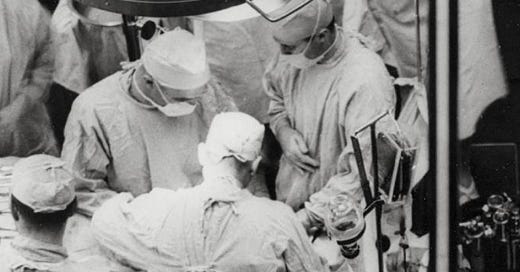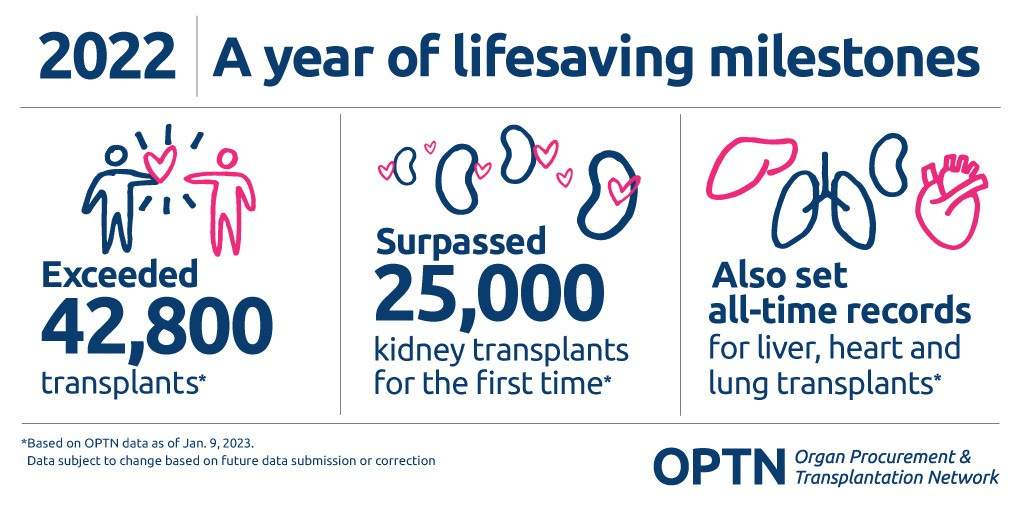Signals From [Transplant] - Part 01: The Landscape
A brief history and the road to one million transplants
Welcome back to Signals From [Space], the place to discover what's next in healthcare technology— and who’s building it — one [space] at a time. I’m a founder and patient sharing my curiosities and earned wisdom along the way.
It took just 68 years from the first successful kidney transplant to reach our one-millionth transplant milestone here in the United States.1
And if that didn't catch your attention, you should know that half of all the transplants ever performed in the U.S. have taken place in just the past 15 years.
During World War II, a young American pilot named Charles Woods burned 70% of his body when his plane exploded during takeoff in Kurmitola, India. A skin graft 6 weeks later in Valley Forge, Pennsylvania saved his life. One of the physicians on his team, Joseph Murray, would go on to perform the first successful kidney transplant 10 years later (to the day), on December 23, 1954.2
Organ transplantation is a life-saving medical advancement and monumental feat of human ingenuity. Yet nearly 55 million Americans alive today were born before the field came to life. If you take nothing else away from this series, I hope you recall one of these key takeaways about transplantation:
It's a lifesaver — 1 million+ transplanted organs and counting
It's growing — all-time records set in kidney, liver, heart, and lung last year3
It's costly — it costs over $440K for a new kidney, and $1.4M for a heart4
It's imperfect — more than 28K organs are wasted each year5
It's promising — thanks to new policies, technologies, and leadership
Just as Dr. Murray and his colleagues laid the foundation for a whole new medical frontier, today's innovators are building on their shoulders, pushing boundaries, and redefining what's possible in organ transplantation.
However, this change is not without its challenges. It requires an in-depth understanding of the existing system and its flaws – and a shared vision for a future where organ shortage is a thing of the past, where transplantation is accessible to all who need it, and where post-operative care ensures not just survival, but the highest quality of life.
Transplantation: by the numbers
Milestones: In 2022 there were over 42,000 transplants performed in the US, including a new milestone in kidney transplants with 25K in a single year. That's an average of 70 kidney transplants per day.
Supply: Deceased donation continued its 12-year record trend, even through the pandemic. Living donation has improved over the past decade, but has varied quite a bit in recent years. For context, deceased donation makes up the lion's share of organs compared to living donation (85% in 2022).6
Demand: Kidneys are the most commonly transplanted organs (59.5% in 2022), followed by the liver (22.2%) and heart (9.6%).
Waitlist: As of writing this there are 103,514 candidates waiting for a transplant. Every 10 minutes someone new is added. Every day 17 people die while waiting. Only slightly more than 50% of people on the waiting list will receive an organ within five years.7
Costs: CMS reimburses around $36,000 per year for transplant patients (on average), covering costs of organs, surgery, and waitlist fees to transplant centers. But the total costs are a lot higher than you might think. In 2017 patients were billed over $400,000 for a kidney and nearly $1.4 million for a heart (see below).
Drugs: Anti-rejection drugs, or immunosuppressants, play a vital role in the long-term survival of transplanted organs. But they're expensive. They can easily exceed $2,500 / month, leaving patients in a difficult spot, often having to decide between everyday life expenses and life-saving medications.8
Part 02: The Opportunity
Now that we have a basic understanding of the history and landscape of organ transplantation in the United States, in Part 2 we'll explore 12 Signals that indicate a promising future for this space. From accessibility to availability, and robotic surgery to real-time monitoring, we’ll meet the people, companies, and technologies building a better future in transplantation.
Hey, Tim here! The goal of my newsletter and podcast is to make the frontiers of healthcare technology more accessible and actionable for everyone. I write and interview experts about topics like learning, startups, commercialization, care delivery, and beyond. Join 4K+ fellow clinical, commercial, and technical business leaders as we explore a new [space] each month.
Joseph E. Murray, Transplant Doctor and Nobel Prize Winner, Dies at 93 (New York Times, 2012)
2022 organ transplants again set annual records (UNOS, 2023)
The Costly Effects of an Outdated Organ Donation System (Bloom Works, 2020)
Waiting for your transplant (UNOS)

![Signals From [Space]](https://substackcdn.com/image/fetch/e_trim:10:white/e_trim:10:transparent/h_72,c_limit,f_auto,q_auto:good,fl_progressive:steep/https%3A%2F%2Fsubstack-post-media.s3.amazonaws.com%2Fpublic%2Fimages%2F2efc1ef1-ba0b-4ca3-b9f6-a9a790da4b38_1344x256.png)

![Signals From [Space]](https://substackcdn.com/image/fetch/w_36,h_36,c_fill,f_auto,q_auto:good,fl_progressive:steep,g_auto/https%3A%2F%2Fsubstack-post-media.s3.amazonaws.com%2Fpublic%2Fimages%2Fa4736f49-6a20-4fd6-a3de-d48cb4b105f2_375x375.png)



